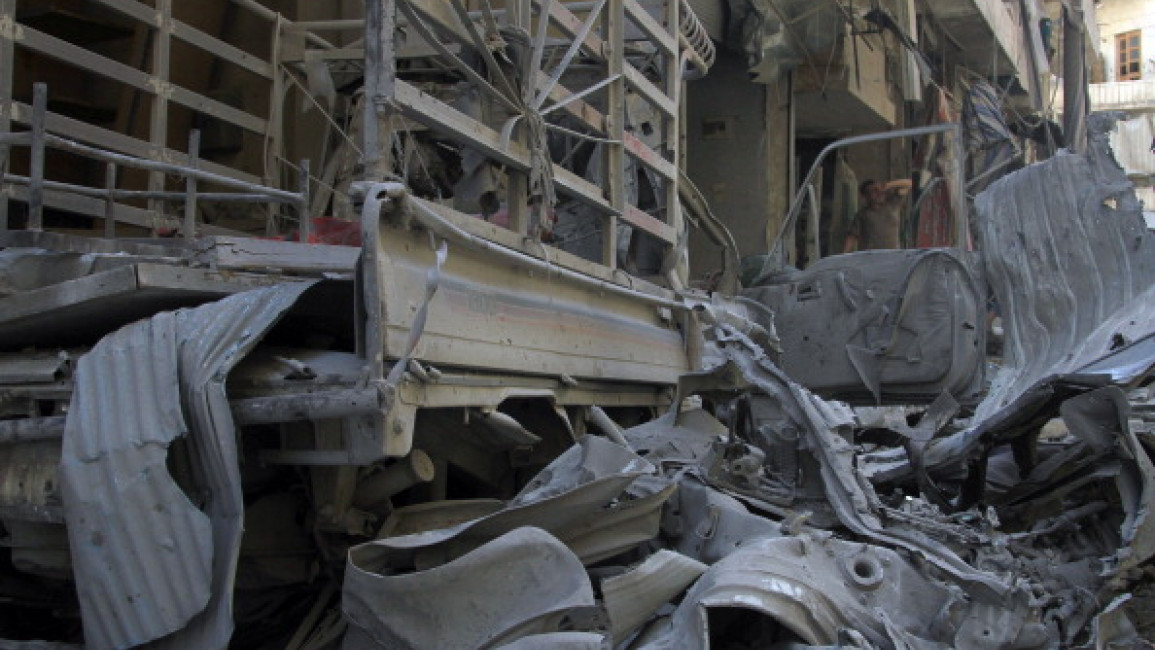Israel ups ante with deadly strikes against Hezbollah in Syria, Lebanon
Israel's military leadership has signalled it will take a newly aggressive posture against Hezbollah across the region after killing at least 42 in a strike on Aleppo and a senior Hezbollah commander in Lebanon on Friday.
Israel struck targets in Aleppo at 1:45 am on Friday in what was its deadliest operation in Syria since 2011, killing at least 42 Syrian soldiers and civilians, as well as at least five Hezbollah fighters.
Israel's military does not typically claim responsibility for strikes carried out in Syria but has carried out strikes against Hezbollah and Iranian-affiliated targets in Syria regularly since 2011.
Later on Friday morning, a drone struck a car in al-Bazouriyeh, southern Lebanon, killing Ali Naim, a medical source working in the ambulance service which recovered the body, told The New Arab.
Israel's army claimed that Naim was the deputy commander of Hezbollah's missile unit. The Lebanese group announced that "commander Naim" was killed but did not specify for which unit he was responsible.
Hezbollah and Israel have been engaged in cross-border clashes since 8 October, after Hezbollah launched rockets "in solidarity" with Hamas's surprise attack on Israeli military bases and civilian settlements in and around the Gaza envolope.
This week saw an intensification of fighting, with Israel killing seven paramedics in a strike on 26 March, striking the Bekaa valley three times in one week, and Hezbollah killing an Israeli civilian in northern historical Palestine.
Following Friday's strikes, Israel's Defense Minister Yoav Gallant threatened that the military would expand its campaign against Hezbollah and increase its frequency of attacks in Lebanon.
"Israel is turning from defending to pursuing Hezbollah; we will reach wherever the organisation operates, in Beirut, Damascus, and in more distant places," Gallant said from Israel's northern command in Safed.
Hezbollah has not yet retaliated for the two strikes in Syria and Lebanon but has previously targeted more sensitive Israeli sites after suffering significant losses.
How will the Syrian regime and Iran respond?
Syrian state media accused Syrian opposition factions of coordinating with Israel in its bombing of Aleppo, claiming that "terrorist groups" – a reference to the Syrian opposition – carried out simultaneous drone attacks in Aleppo.
The Syrian Ministry of Defense posted pictures of the corpses of fighters from Hayat Tahrir al-Sham (HTS), an Islamist opposition group which controls northwest Syria, claiming to have repelled an attack from the group at the same time as Israel's bombing.
The Syrian government's statements were followed up by Iran's Foreign Ministry Spokesperson, Nasser Kanaani, claiming that there was "clear evidence for Israel's support for terrorist groups and currents in Syria."
Following Israel's strikes on Aleppo, pro-regime accounts on social media began drawing links between Israel and HTS.
#Israel attacks #Syria #Aleppo in collaboration with #AlQaeda #Idlib ( @QudsNen pls note) proving terrorists in #Syria are not with #Palestine. Israel is facing defeat/extinction & at its most dangerous. https://t.co/1BPQhxZFVG@IbrahimDSY1 pic.twitter.com/dFNKnLaSrC
— vanessa beeley (@VanessaBeeley) March 29, 2024
Israel has stepped up its bombing of Syria since 7 October, intensifying its attacks on Iranian and Hezbollah-affiliated targets.
The Syrian regime has focused its response on the Syrian opposition groups rather than Israel itself. In October, the Syrian regime began a fierce bombing campaign in the opposition-held northwest.
The bombing campaign began after Israel targeted Damascus and Aleppo airports on 12 October, which the Syrian Ministry of Defence said was part of Israel's support of "extremist groups" in northern Syria.



